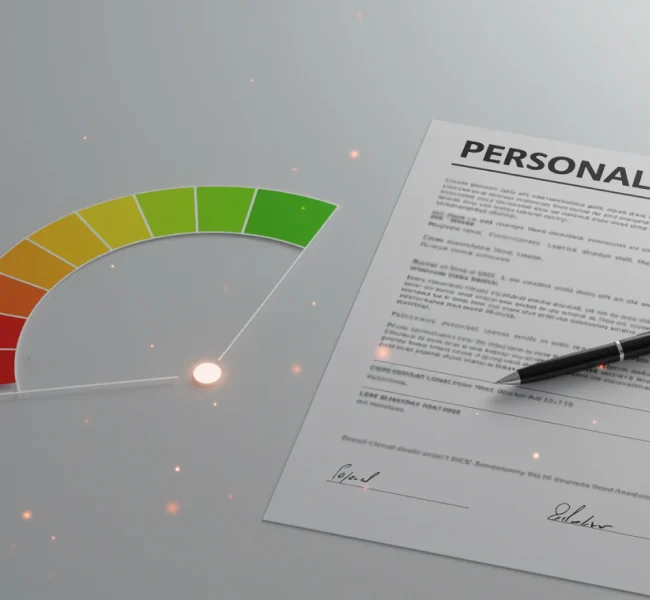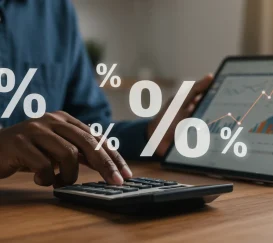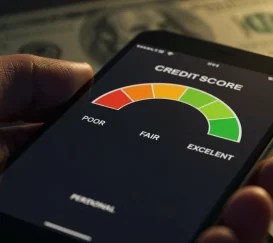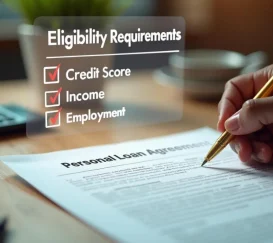Personal loans can be used for many purposes — from debt consolidation to emergency financing. However, they can have a negative impact on your credit score if you approach them carelessly.
BadCredify explains how exactly personal loans can improve your credit score when used responsibly, as well as how misuse can harm your rating. Here’s what you need to know before borrowing money to boost your future creditworthiness.
- The impact of your personal loan on your credit score depends on how you manage your debt.
- Applying for a personal loan may temporarily decrease your FICO rating if a lender performs a hard credit check.
- Through timely payments, personal loans can raise your credit score.
- Personal loans may positively affect your credit mix, which will increase your FICO rating.
- Late or missed payments will lower your overall score.
- You can use your personal loan to consolidate high-interest credit card debts, which may lower your credit utilization and boost your credit.
How Do Personal Loans Affect Credit Score
Let’s discuss how personal loans can sometimes help and other times harm your credit score.
When Are Personal Loans Good For Credit Scores?
At BadCredify, we’re dedicated to responsible borrowing. By following these guidelines, you can potentially enhance your credit score with a personal loan.
On-Time Payments
Your payment history is a huge factor in your credit. It makes up about 35% of your FICO score. Each and every on-time personal loan payment becomes a positive entry on credit reports.
Consistent on-time payments demonstrate to lenders that you are a responsible borrower. Over time, your credit rating will increase, but your starting score determines how quickly it will happen.
Credit Mix Factor
Another factor that influences your credit score is your credit mix, which shows how you can manage different debt types. Personal loans are considered installment loans, whereas credit cards relate to revolving credit.
If your credit history mostly consists of information on revolving credit, opening up an installment loan account will help you achieve diversity in a credit mix. This makes up about 10% of your FICO score.
Make Your Credit Utilization Ratio Lower
Credit utilization ratio demonstrates how much revolving credit you use compared to the total amount of available credit. This comprises roughly 30% of your FICO credit score.
The lower this percentage, the lower your dependence on revolving credit will be. You should try to keep your CUR below 30%.
How will a personal loan help? You could consolidate your high-interest credit card debt through it. This would lower your credit utilization rate and increase your FICO score over time.
When Are Personal Loans Bad For Credit Scores?
Personal loans may affect your credit score in a bad way, too, when you mistreat your debt responsibilities. Here are some situations where your FICO rating may drop when you borrow money.
Hard Credit Checks
A personal loan application will require a hard credit inquiry to assess a borrower’s ability to repay. A hard check might lower your credit score for a short duration. One inquiry is likely to lower your score by about 5 points. The more you apply, the more noticeable the impact is.
The inquiry will stay on your credit report for two years, but its effect on your score lessens over time. This means that an individual should have as few hard inquiries as possible. Therefore, you should only apply for a loan in case of need and give some space between each application.
Increased Debt
When you obtain a new personal loan, it’s added to your current debt load. That additional debt will become a financial burden with poor management and can negatively impact your credit rating. Review your budget to determine if you can comfortably afford to make your payments before applying for a personal loan.
Missed Payments
Missing payments on a personal loan will severely damage a credit score. Lenders send this information to the credit bureaus, and it stays on your credit report for up to seven years. This can make getting a loan in the future more challenging. Even if you get one, it’s likely to have high interest as you will be considered a risky borrower.
Tips for Using Personal Loans to Build Credit
Personal loans can be a great tool for building credit if you use it responsibly. Check out these tips for effectively improving your credit.
Organize Your Budget
Having a budget ensures you can live within your current means. It will enable you to allocate your income in a way that will meet your most vital expenses, including your repayment obligations.
How to Create a Budget
- List all sources of income.
- List all monthly expenses — including loan payments.
- Subtract your expenses from your income.
- Adjust your spending to the remaining amount.
Pay More Than Minimum
When you repay a personal loan, you cover both the principal amount and interest. The loan principal is the original amount you borrow while interest is a cost of loan set by your lender.
Interest is charged on the remaining principal balance. By paying more than the minimum, you reduce the sum you owe, minimizing your total interest paid. Additionally, you can pay off the loan sooner.
Set Up Automatic Payments
You can avoid missed payments and make debt management easier by setting automatic payments. This will help you maintain a good payment history, and your credit score could increase. Most lenders allow borrowers to set automatic payments to get their money timely throughout the loan life. Some will also offer interest rate discounts.
Consider Your Credit Goals
Consider the long-term financial plans you have and how a personal loan can help you reach them. Make sure that new debt furthers your purposes in the long run instead of taking you away from them.
For example, if you hope to build credit to get better mortgage terms in the future — taking out a personal loan and repaying it on time can be a big help.
Things to Consider Before You Borrow Money
Before you decide to borrow money, it’s crucial to fully understand what you’re going into. Pay close attention to these details to choose the right loan offer.
Interest Rate
An interest rate is a very important component of any loan. It directly influences the monthly payments and the total cost of borrowing.
The interest rate on a personal loan may be either fixed or variable. At a fixed rate, you are charged the same percentage for the whole length of the loan. Variable rates can fluctuate according to the market conditions. They often start lower than fixed ones but are riskier and less predictable.
Annual Percentage Rate
The APR is a real cost of borrowing per annum. It consists of the interest rate and any extra fees associated with your personal loan. It gives you an opportunity to compare loans and see which one will be cheaper. Aim for a loan with the lowest possible APR.
Repayment Terms
Repayment terms show how long and when you need to make your loan payments. They may vary from 2 months to about 7 years. The length of the repayment period affects your monthly payments and total loan cost. A shorter period means higher payments but lower costs, while a longer one makes it easier to manage payments but results in a higher total interest paid.
Your Ability to Repay
Being realistic about your current financial situation is crucial to avoid late payments and future financial strain. Start with calculating how much money you need, choose a convenient repayment period, and make sure your monthly payments are within your means. Plan for repayment and include your new debt obligation to your budget so as not to miscalculate.
Does Getting a Loan Affect Your Credit Score? — Conclusion
Personal loans may leave a positive or negative impact on your credit score. Responsibly paying on time, holding several kinds of credit accounts, and maintaining a low credit utilization ratio can enhance your credit score. Overborrowing, initiating multiple hard inquiries, and having late or missed payments will drop your credit score.
FAQ
Does a personal loan hurt your credit score?
Personal loans can hurt your credit under certain conditions. Your FICO rating might drop by a few points when you apply for a personal loan. Missed payments can cause a much steeper loss. Additionally, a personal loan will increase the amount of debt you owe.
Do personal loans build credit?
Making on-time and consistent payments on your loan could be helpful in building credit. The credit mix section of your credit report also gives you points for responsibly handling installment loans. A personal loan can help you build credit even more if you use it to consolidate your high-interest credit card debts.



